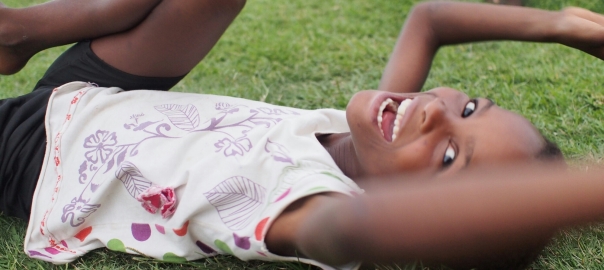Be-Xhosa I’m happy, sing along if you feel like happiness is the truth…
(Written by Steph, photos by Nick)
Heading down the highway, I slowed down trying to scan the faces of the people stood at the side of the road waving 10 rand (50p) notes in their hands, as if I would somehow be able to tell if someone was ill-intentioned or not. I wasn’t sure that a car-jacker would be so courteous as to make a really mean face, just to make you aware of his objective. Now, given the fact that we were in South Africa, I was aware that trying to pick up hitchhikers wasn’t the most sensible idea I had ever had, but each time I saw them (and there were many), I couldn’t help but feel awful. I had the privilege of a car, and yet, I couldn’t share that with those that couldn’t afford the same and simply needed a ride to travel, often immense distances. In a country with reports of violent car-jackings run-of-the-mill stuff, we were advised strongly against it.
Our loop of South Africa had taken us from the beautiful beach destination of Cape Town, along the garden route. We were now heading towards Pietermaritzberg, via somewhere called ‘Coffee Bay’ in The Transkei. I’m a tea drinker myself, but I decided I could take the hit; so many people had raved about this place. As we turned off the perfectly tarmaced N2 onto a dirt road riddled with potholes, it was clear we were about to discover another, more rural, side to this fascinating country.
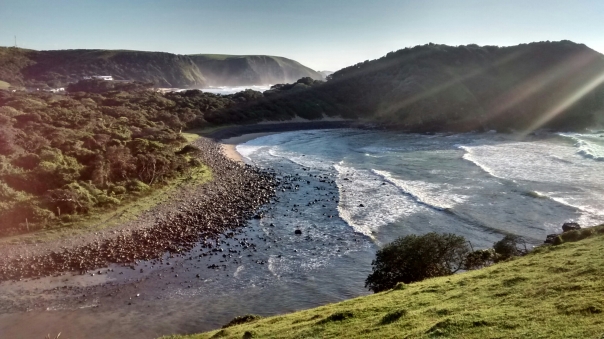
Run, Forest, run!
The boy was giving Ussain Bolt a run for his money, something we were unfortunately unable to say about the internet in the country. Given his attire, I thought it was a fairly safe bet that he wasn’t a murderer. Finally I got to pick up a hitchhiker – an extremely polite boy named Thembani, who was late for school. Success! We had picked up a hitchhiker, no one got hurt, a boy got to class on time, and, selfishly, I could ease up on the guilt-trip I had been putting myself through. So when we saw two girls on the side of the same rural road that we had been driving on for the last hour, I was ready to go again. Local people were obviously very friendly.
“Ay waant eet”
The girls wanted to be dropped somewhere we didn’t know the name of, but since this never-ending road only went one way and was sans turn-offs, we figured we couldn’t go too far wrong. So, off we went.
Our attempts to converse in English weren’t going so well, and it soon became apparent that they only spoke the essentials, like, “My nayme ees…” and “Ay waant eet.” The “eet” related to some biscuits dumped on the back seat, and we were more than happy to oblige. But Nick wasn’t going to stop there. “Here, have some popcorn,” he threw in with a smile. By the time we got to the clinic, the back seat looked like a food fight had broken out and Nick’s cheshire grin had morphed into a slightly puzzled expression. They got out of the car and said, “Thank you,” but not before scanning for anything else they could grab, including my bottle of water. I guess all that salt was dehydrating.
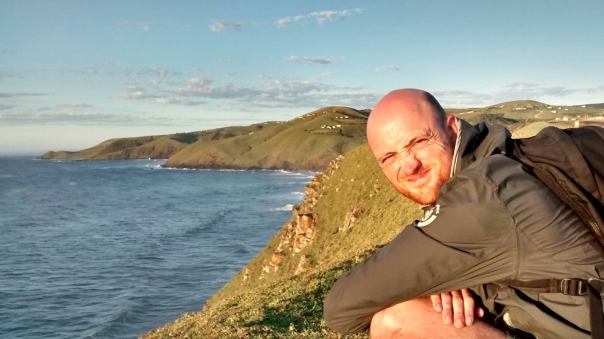
As surreal as it was, it was interesting to be a bit more exposed to black South Africans. Until that point, we had only had passing exchanges – buying something in a shop, listening to a busker, watching a protest, booking into a dormitory, hiring a car. The one thing I was afraid of when coming here was that we wouldn’t be able to mix like we had done in Asian countries. Sure, there were township tours in Cape Town, but I didn’t want to pay lots of money to go and ogle at people who had nothing. There was something that didn’t sit right with me about that. I really wanted to interact, and on a simple level.
Squeeeeze!
When we eventually arrived in Coffee Bay, on “The Wild Coast” there was beer, but no coffee. Now that’s what I call an upgrade. The whole area comprised of a very rough, but stunning, coastline, and when a European ship carrying coffee beans ran aground there, the bay in question became Coffee Bay.
We were in the heart of rural South Africa and home to the largest community of Xhosas in the country (Zulus are the largest African group here, followed closely by the Xhosas; together they make up approximately half the black population).
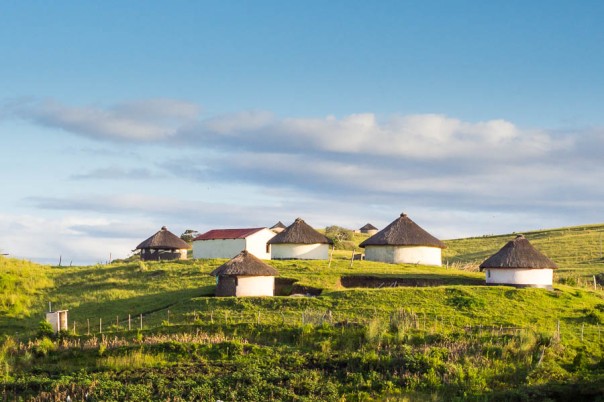
I was interested to find out that the backpacker’s place we were camping in only employed people from the local Xhosa community, and were obviously ploughing many efforts and funds from the guesthouse into improving quality of life and education for the locals. Advertised online they had a multitude of fun activities for young people: surf lessons, coastal hikes, picnics – but the one thing that we couldn’t leave without doing was a homestay with a local Xhosa family. I had no idea what to expect, but we hoped to at least get a better understanding of their life. Plus we got to stay in one of those ‘rondavals,’ a traditional round house made of mud and concrete. Awesome.
At 3pm African time (that’s 4pm to you and me), Elvin, the father of the family came to pick us up. A short 30 minutes walk (for us anyway – he was on crutches) and one crossing of a small river, we were on the top of a rolling green hill, air fresh as a daisy. This was their home. Nothing around for miles except peace and quiet and a few cows. And then, in the distance, screams of manic excitement pierced the silence. Suddenly we were ambushed by two young girls, energy like bottles of pop, ready to explode. They threw their arms around me and gave me one of those squeezes you give a long lost friend – one where you don’t want to let go. Taken aback momentarily, I steadied myself and took a deep breath. We were in the kids’ zone and I knew just what to do.
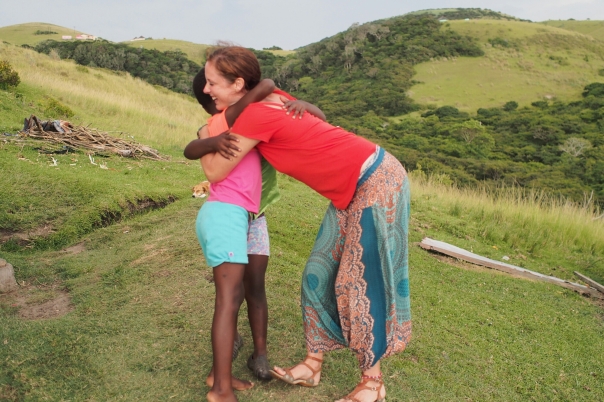
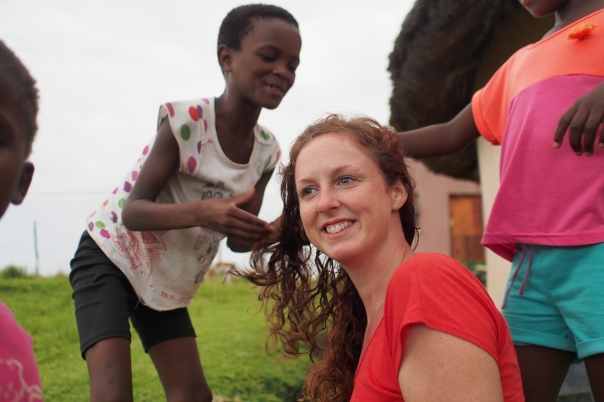
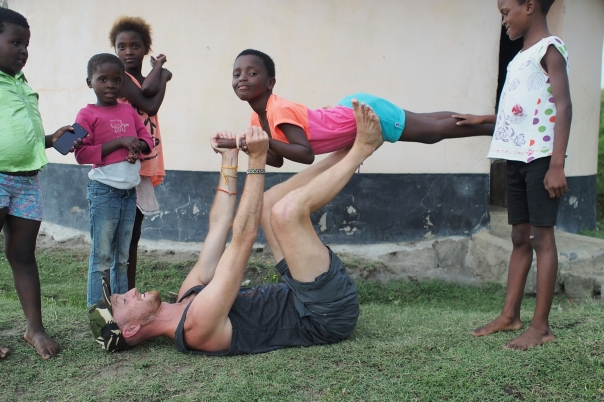
The next three hours were spent in utter chaos: songs were sung, dances were danced, pictures were taken (by the kids – we had no chance!) acrobatics were performed, and kids were swung around. We were with Elvin’s eldest daughter, Zama, 14; the two mini firecrackers, Mengalally and Sia; and a group of their friends. I had wrongly assumed that Mengalally and Sia were Elvin’s children; they were, in actual fact, his nieces. However, the Xhosas make no such distinctions, which I subsequently read in the autobiography of the most famous Xhosa, Nelson Mandela. Your cousin is your brother and your auntie is your mother. Sounds confusing, but the point is that family is family, and they all look after each other as such. While all this was going on, Zama was intermittently herding the cows, and the goats, and baking bread.
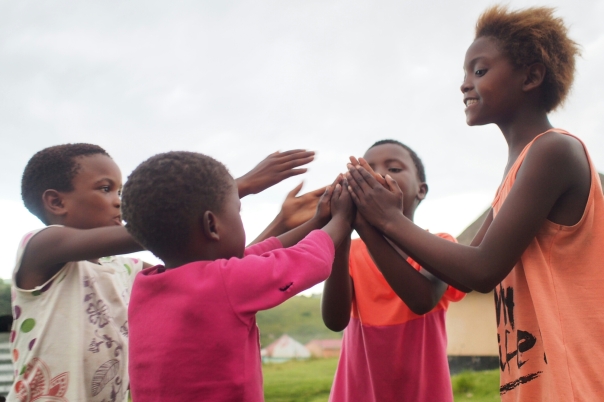
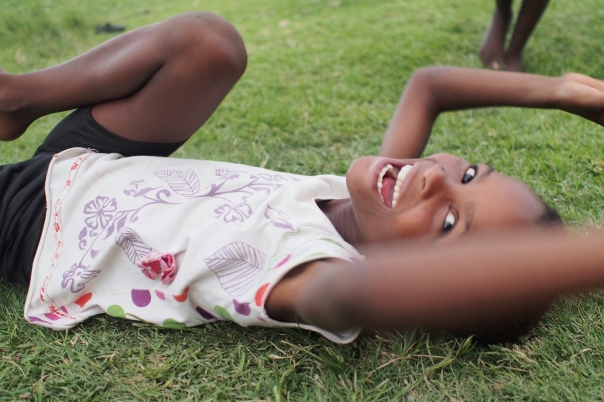
“Oh. If you had two, I would have asked you for one”
I was in my comfort zone and enjoying the simplicity of cross-cultural interaction with children when Zama asked me how many phones I had. “Oh. If you had two, I would have asked you for one.” I had to laugh at the boldness of the girl, but I felt for her. Pulled between a rural existance with no running water and no electricity, and the educated life her parents are willing her to attain, she is a girl that has been exposed to modern things, but is not in the position to have them. When pushed about why she wanted a phone, her answer was that she wanted to Whatsapp her friends in the evening. The small matter of charging the phone, internet connection and buying credit, just tiny hurdles in her teenage brain of infinite possibility.
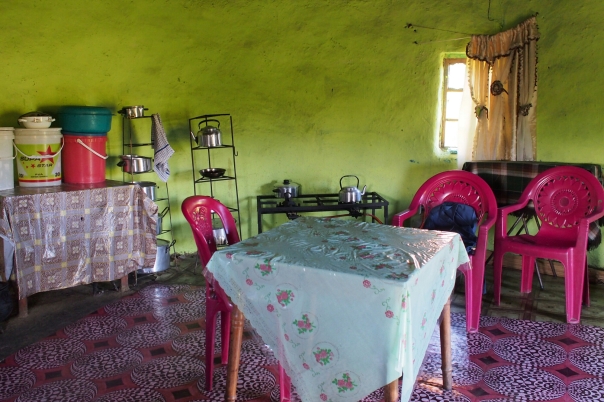
Dinner was up, and we were slightly perplexed to find that, although Elvin’s wife had been slaving over the pots and pans, she wasn’t sitting down with us. In fact, she barely got an introduction. After the HUGE meal of miele (corn), spinach, potatoes and beans, all grown by the family, Elvin decided we might be hungry from the lack of carbs, so he proceeded to serve us up a big slab of bread. They say The Big Bang was the biggest explosion in history, but my belly was about to beat that.
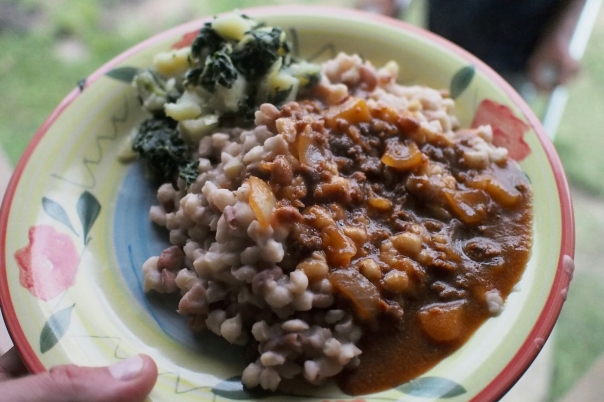
“[Click]-hosa”
Around the dinner table, and with the little ones now subdued from their full tummies, the conversation turned to practice of the Xhosa language. Their X’s C’s and Q’s are pronounced like different types of clicks, and me being me, I was having fun taking on the challenge. Zama was only too happy to drill me and even happier that I was so bad; my obvious inadequacy was rewarded with an exaggerated roll of her eyes and a smirk.
As it was now pitch black outside, and Zama had to be up early in the morning to start her hour and a half walk (!) to school, it was time to retire to our rondaval, but not before a quick trip to the outhouse toilet. With our head torches mounted, we stumbled and giggled like idiots as we crossed the uneven ground to reach it. The family have no such problems; even with no light they can navigate their way, knowing every inch of the land as a blind person would.
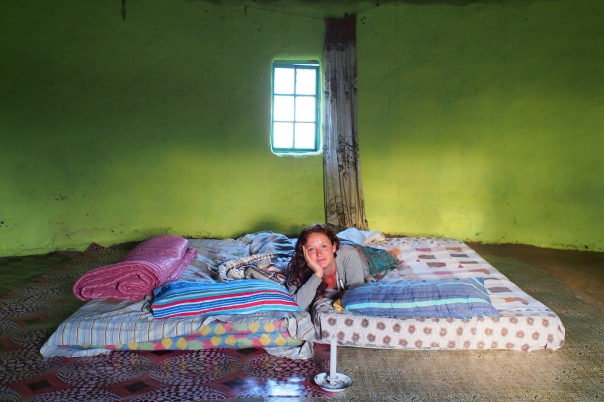
We awoke to the smell of farm yards. It wasn’t the cow outside our window, but the floor. I had forgotten that another material they use in the rondavals is dung. This makes the floor nice and glossy, and apparently the smell does disappear after a while. Ours was obviously a shiny new one. It was still early, but already Zama was up and dressed, had collected us water from a nearby village tap, and was heading off to school. After a quick wash in a bucket, and a goodbye to the kids, we sat down with Elvin to eat bread and drink coffee and find out more about life as a Xhosa.
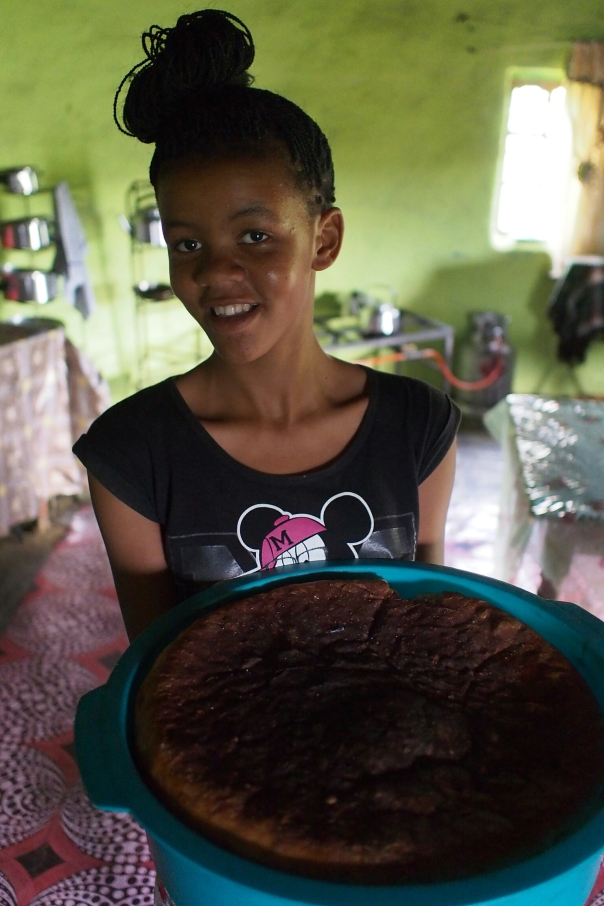
Xhosa traditions:
We learnt about many Xhosa traditions, such as, if a man and woman get married, the groom’s parents must give a few cows to the bride’s parents, which is a bit like the dowry tradition in India but the other way round. To stop arguments between couples, they also added in a rule that if a man fights with his wife, she will go and stay with her parents. He must then pay them a cow to get his wife back! Cows are valuable and there are evidently a lot of them going back and forth here.
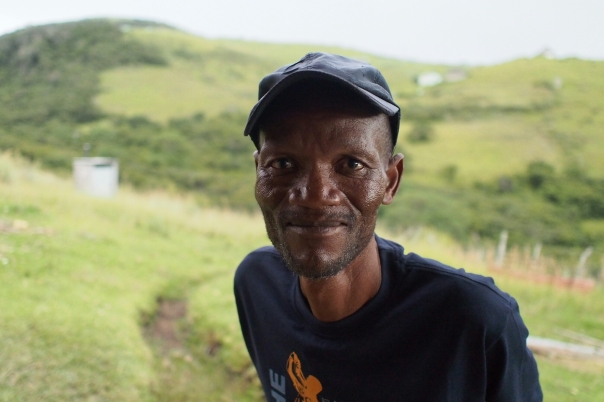
We also were privileged enough to hear all about Elvin’s experience of apartheid. How he mined platinum for the rich Afrikaners (white, Dutch origin), and about how, as a black man, if you dared to try and speak to a white man in those days, you would be beaten. Far from being bitter, Elvin actually welcomes white tourists into Coffee Bay, acknowledging that without tourism, there is little way to make any money there. In fact, this area is apparently the poorest area in South Africa. The majority of people lead a sustenance existance, growing corn in the summer and vegetables in the winter. What little money they can make, from selling jewellery, working in guesthouses or shops, they spend on milk and flour to make their daily bread. It’s a simple life, and one they work hard to maintain, but they hope for more opportunities for their kids. With their hard work ethic, I hope the same for them, too.
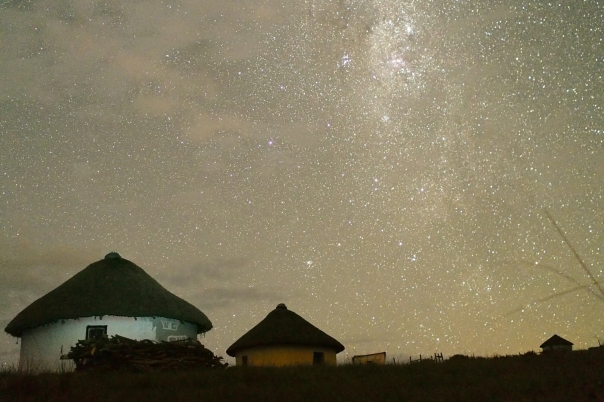
Here’s a video that Zama took of her cousins and their friends singing and dancing. Amazing energy!!
